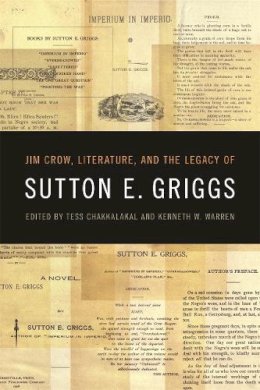
Jim Crow, Literature, and the Legacy of Sutton E. Griggs (The New Southern Studies Ser.)
Imperium in Imperio (1899) was the first black novel to countenance openly the possibility of organized black violence against Jim Crow segregation. Its author, a Baptist minister and newspaper editor from Texas, Sutton E. Griggs (1872–1933), would go on to publish four more novels; establish his own publishing company, one of the first secular publishing houses owned and operated by an African American in the United States; and help to found the American Baptist Theological Seminary in Tennessee. Alongside W. E. B. Du Bois and Booker T. Washington, Griggs was a key political and literary voice for black education and political rights and against Jim Crow.
Jim Crow, Literature, and the Legacy of Sutton E. Griggs examines the wide scope of Griggs’s influence on African American literature and politics at the turn of the twentieth century. Contributors engage Griggs’s five novels and his numerous works of nonfiction, as well as his publishing and religious careers. By taking up Griggs’s work, these essays open up a new historical perspective on African American literature and the terms that continue to shape American political thought and culture.
Product Details
About
Reviews for Jim Crow, Literature, and the Legacy of Sutton E. Griggs (The New Southern Studies Ser.)
Eric J. Sundquist
Andrew W. Mellon Professor of the Humanities, Johns Hopkins University
This essay collection on the perennially underappreciated African American writer of five novels and numerous tracts reveals a Sutton Griggs that no single monograph has yet shown: not the definitive figure but a political chameleon, placed in a striking series of rigorously researched historical contexts, from the border culture of Texas, where he lived, to the emerging race-citizenship complex of the United States as an imperial nation. The Jim Crow era itself emerges throughout the essays as more of a paradox than we’ve known, both the nadir of African American history and the heyday of the race novel, if not of African American literature as a whole.
Susan Gillman
author of Blood Talk: American Race Melodrama and the Culture of the Occult
In assembling ten excellent essays that together address all of Griggs’s novels and many of his nonfiction works, a valuable chronology of Griggs’s life and times, and a useful list of secondary sources, Warren and Chakkalakal have fashioned a recovery project that makes a significant contribution to literary history more generally and. Indeed, in offering a rich accounting of this author’s life and works, the volume also, subtly but forcefully, asks us to meditate on the meaning of recovery, both in our scholarly writing and in the classroom.
Gregory Laski
American Literary History
Chakkalakal and Warren have assembled a range of impressive contributions from both rising and established scholars of African American literature. Their rather considerable expertise on turn of the century Jim Crow culture and history makes the book accessible to readers who are unfamiliar with the strange and wonderful universe summoned in Griggs’s fiction. At the same time, their historical and political lens proves to be an ideal strategy for persuading literary critics about the aesthetic value and significance of Griggs’s idiosyncratic narratives.
Justin Rogers-Cooper
Journal of African American History
[Chakkalakal and Warren] have put together a book of remarkable breadth and scholarship. Not only Griggs’s enthusiasts, but, indeed, anyone interested in the Jim Crow Era, the history of Texas and the Mexican- American War, manifest destiny and American imperialism, and the interplay of writing and reading between blacks and whites during the nineteenth century should include this work on his or her book shelf. . . . The University of Georgia Press has published another jewel in their superb New Southern Studies series.
Sharon Ammen
Journal of American Culture
